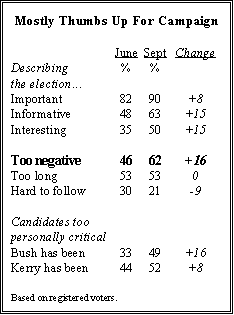
Views of the campaign, which were already mostly positive in June, have improved over the summer. More voters think the campaign is important (90%) and informative (63%). And the number who say the campaign is interesting, rather than dull, has risen from 35% in June to 50% now.
Although voters are more engaged in the campaign, an increasing number also view it as excessively negative. Fully 62% say the campaign is too negative, up from 46% in June.
Since then, more voters believe that both candidates have been too personally critical but the change has been more apparent in evaluations of Bush. About half of voters (49%) now believe Bush has been too personally critical of Kerry, up from 33% in June. A similar percentage (52%) says Kerry has been too personally critical of Bush, compared with 44% in June.
This represents a significant change from the 2000 campaign. In early October 2000, just 29% said Al Gore was being too critical of Bush, while somewhat more (40%) felt Bush was being too personally critical of Gore. Current evaluations of the tone of the campaign are similar to the 1988 contest. In October 1988, 52% of voters felt that George Bush Sr. was being too critical of Michael Dukakis, while 45% said the same about Dukakis’s criticisms of Bush.
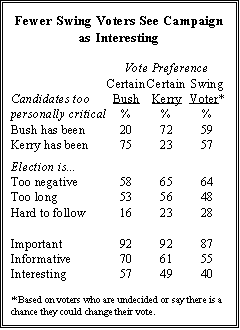
Swing Voters View the Campaign
As expected, Bush and Kerry supporters overwhelmingly blame the opposing candidate for being too personally critical. By contrast, swing voters blame both Bush and Kerry for being excessively critical (59% say Bush, 57% Kerry).
In general, the campaign perceptions of swing voters are not markedly different from those of committed voters. However, swing voters tend to find the campaign less interesting than other voters. Four-in- ten swing voters say the campaign is interesting, while 50% say it is dull. In addition, somewhat more swing voters than either Bush or Kerry voters say they find the campaign hard to follow. But swing voters are less likely than committed voters to say the campaign is too long.
Battleground Ad Wars
Ad penetration is extensive in this election, especially in the battleground states where most voters have seen at least some campaign ads.
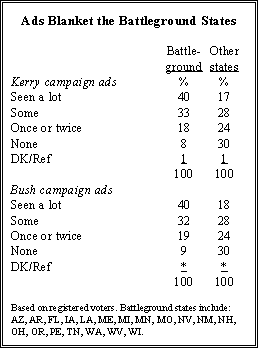
The greater visibility of the campaign in the battleground states appears to be contributing to voter weariness with the election. More voters in the battleground say the election is too long and too negative compared with those in other states.
Exposure to the campaign advertisements is reaching saturation level in the ad-intensive battleground states. Four-in-ten voters in battleground states say they have seen a lot of Kerry’s campaign commercials, and the same number (40%) report seeing a lot of Bush’s ads. That compares with 17% in other states who have seen a lot of Kerry ads, and 18% who report seeing a lot of Bush’s ads.
Three-in-ten voters in non-battleground states say they have seen no ads for Kerry and the same percentage of voters say they have not seen any of Bush’s ads. Fewer than one-in-ten voters in the battleground have not seen ads for Kerry and Bush.
Voter Weariness in the Battleground
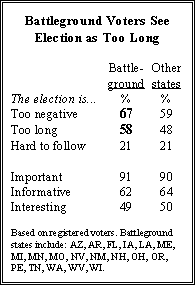
The intensive exposure to the campaign in battleground states is taking its toll on the voters there. Nearly six-in-ten (58%) voters in battleground states say the campaign is too long compared with 48% of voters in other states.
Moreover, the intensity of negative campaign advertising in battleground states may be fueling perceptions that the election is too negative. Two-thirds of voters (67%) in the battleground states say the campaign is too negative, compared with 59% of voters elsewhere. But in battleground states, as in other states, about equal portions of voters say that Bush and Kerry have been too personally critical.
Other evaluations of the campaign are fairly similar across battleground and other states. Like voters elsewhere, about six-in-ten voters (62%) in battleground states say that the campaign is informative and about half (49%) view it as interesting. There is broad agreement among all voters that the election is important.
Frequent Ad Viewers
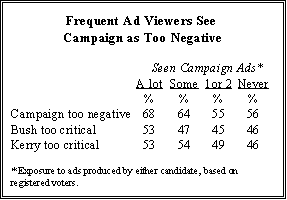
Voters who have seen a lot of campaign ads, regardless of where they live, tend to view the overall campaign as having an excessively negative tone.
More than two-thirds (68%) of frequent ad viewers describe the campaign as “too negative,” compared with 55% of those who have seen campaign ads only once or twice. Those who have seen a lot or some campaign ads are significantly more likely than less frequent viewers to say the campaign has been too negative.
Increased Engagement in Campaign
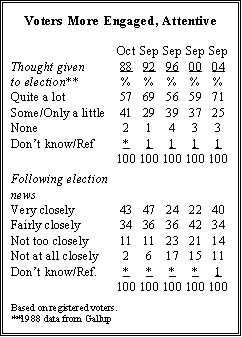
This presidential election continues to engage more voters than the campaigns of four and eight years ago. More than seven-in-ten voters (71%) say they have given quite a lot of thought to the coming election. That is a significant increase from comparable points in the two previous campaigns. Four years ago at this point in the campaign, about six-in-ten voters (59%) said they had given quite a lot of thought to the election. The current level of electoral attentiveness is similar to 1992, when 69% of voters reported giving the election a lot of thought. Engagement with the campaign is up across all subgroups this election.
Similarly, more voters are paying close attention to news about the election compared with past elections. Four-in-ten voters are paying very close attention to election news. This is almost double the number at this stage four years ago (22%), although somewhat below election news interest at this point in 1992 (47%). Overall, about three-quarters of voters (74%) are following election news at least fairly closely.
Hurricanes Top News Interest Index
News reports on hurricanes and the Russian school tragedy dominated this month’s news interest index. Fully half of Americans (52%) followed news of Hurricanes Charley, Frances and Ivan. As expected, attention to the storms was greatest in the South, with two-thirds tracking the hurricanes very closely.

Nearly as many Americans (48%) paid very close attention to the killing of Russian school children by Chechen rebels. Among past stories about Russia and the former Soviet bloc, only the opening of the Berlin Wall in 1989 (50% very closely), the breakup of the Soviet Union in 1991 (47%), and the Chernobyl nuclear accident in 1986 (46%) have attracted comparable interest.
Public interest in news from Iraq has risen over the past month. Nearly half of Americans (47%) followed reports on Iraq very closely, up from 39% in August.
Four-in-ten paid very close attention to election news in September. That is nearly twice the level of interest at comparable points in 2000 and 1996 (22% and 24%, respectively), but is lower than attention at this stage in the 1992 campaign (47% among registered voters).
Interest in the Republican convention (22%) was on par with attention to the Democratic convention last month (23%). Four-in-ten Republicans followed the convention very closely, which is nearly identical to the proportion of Democrats who paid close attention to their convention (41%). Similar proportions of swing voters followed these conventions (16% Republican convention, 17% Democratic convention).
Overall, one-quarter of Americans say they have paid very close attention to campaign ads in which ‘Swift Boat’ veterans have criticized John Kerry’s Vietnam service. Male veterans and committed Bush voters express strong interest in this story (40% and 34%, respectively). Democrats and Republicans are about even in their levels of attention, although conservative Republicans are paying the most attention (36%).
Slightly fewer Americans (21%) closely followed reports on President Bush’s service in the National Guard during the Vietnam War. This story has attracted the same level of interest from certain Kerry voters (34% very closely) as the Swift Boat reports have drawn from committed Bush voters. Significantly fewer male veterans (28%) are following this story than are following stories about the ‘Swift Boat’ criticisms of Kerry.
About four-in-ten Americans (39%) are following news about the economy very closely, which is on par with measures over the past three years. A quarter of Americans tracked news from the summer Olympics in Athens very closely, which far below the 45% who paid close attention to the summer games in Atlanta in 1996.
Roughly one-in-five Americans (19%) followed former President Bill Clinton’s heart surgery. This story drew much more interest from Democrats than Republicans (31% vs. 12%).
More than twice as many African Americans as whites followed news on Clinton’s surgery very closely (39% vs. 17%), and blacks showed more interest in this story than any other demographic group.

